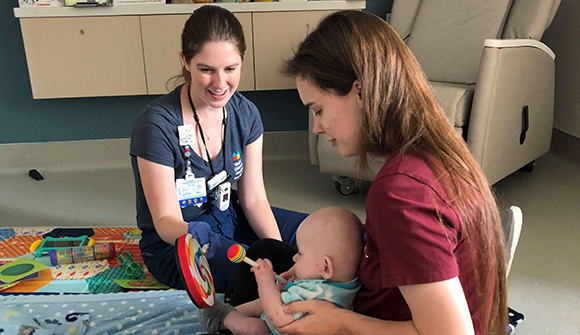Comforters-in-chief
Child Life specialists help kids through play.
Article Date:

Hospital stays can be scary and confusing for children because everything seems new and different, and they may not fully understand what's happening to them. It's important to help children learn by giving them information in a way that makes sense to them and meets them where they're at.
Therapeutic play
The Child Life program at Wolfson Children's Hospital provides essential support in reducing the fear and anxiety associated with the medical environment. Kara Williams, one of 12 Child Life specialists, uses play, education and support to help kids of all ages cope with the anxiety and fear of being in the hospital.
"We work to normalize the environment for patients and families making it as comfortable as possible for them during their stay," Williams said. "We also provide medical procedure preparation and support using developmentally appropriate language, as well as emotional and coping support. Our Child Life services include different types of play such as medical play, arts therapy and other therapeutic interventions. This helps kids become more comfortable in the hospital setting to assist in alleviating stress and anxiety and create a positive healthcare experience."
Depending on the age and development of the child, the Child Life specialist might come equipped with a stash of fun items to brighten their little patient's day: Infants might receive crib soothers, rattles or mobiles, while toddlers and preschoolers might get blocks, Play-Doh®, coloring books or small puzzles. School-age children might be offered LEGO® kits, DIY craft kits, BARBIE® dolls or Hot Wheels®.
Family support
The program also offers emotional support for concerned parents looking to help comfort their child alongside Child Life professionals. Williams said validation is key.
"Being in the hospital can be scary, especially for a child, and validating them allows them to feel seen and heard," she said. "I would also recommend using honest, concrete language. Being honest shows that no one is hiding anything from them and ultimately allows them to be in a trusting environment where they are able to cope more effectively. If appropriate, talk to them about what is making them scared and provide that open space for them to share what they're feeling."
Music therapy
One of three music therapists at Wolfson Children's, Caroline Cox makes her rounds in the Neonatal Intensive Care Unit (NICU), helping to soothe some of the hospital's tiniest patients.
"When they're that little, I start with lullaby songs so they start learning very early on that sound is positive because, in the NICU, they can be exposed to so many 'negative' sounds. These can include monitor sounds, alarms and even loud talking, which can be overstimulating for our tiny babies," she said. "Especially because if they were in the womb, they would be hearing Mom's voice and other positive sounds, so it's important to continue to get that language exposure early on, even as they're still growing."
Music therapists use a variety of tools to accomplish therapeutic goals with children, whether that's to increase relaxation, increase motivation, decrease anxiety, or to help with pain management or mood elevation.
"Across the board, we know that kids love music therapy because it's such a non-threatening medium," Cox explained. "What's really cool about it is as opposed to typical therapy or working with a nurse or a doctor is that we're able to come in with instruments that are super fun and motivating for kids. For my babies that are older, I'll bring in baby shakers, rain sticks or ocean drums. They get very excited because they're colorful and make fun noises, and we can use that to engage them in those goals."
Calming agents
Child Life Specialist Christine Foy works with pre-surgery patients, helping them feel safe and comfortable before their procedures.
"You get to know your patients and their cues," she said. "Every patient is different. What might comfort one child might not work for another. A patient might curl into a ball while I'm explaining a procedure and that's a sign that I need to back off and not talk about it anymore."
When in doubt, the Child Life team can always turn to their leader, Susan Kinnebrew, for guidance. As the director of Family Support Services and a certified Child Life specialist herself, Kinnebrew meets regularly with the team to provide crucial support.
"We check in with her to talk about a difficult case or to make sure we're all practicing self-care techniques," Foy said.
From tonsillectomies to stem cell transplants, Child Life specialists are there to guide patients and their families through a potentially scary time.
Said Foy: "I'm here to make their stay go as smoothly as possible."
Help us provide family-centered care for our patients
Child Life specialists rely on donations to ensure they have everything they need for their patients, from sensory toys to gift cards to celebrate special occasions. Give year-round at christmasjuly.com or shop our Amazon registry for the most needed toys, and they'll ship right to Child Life.



